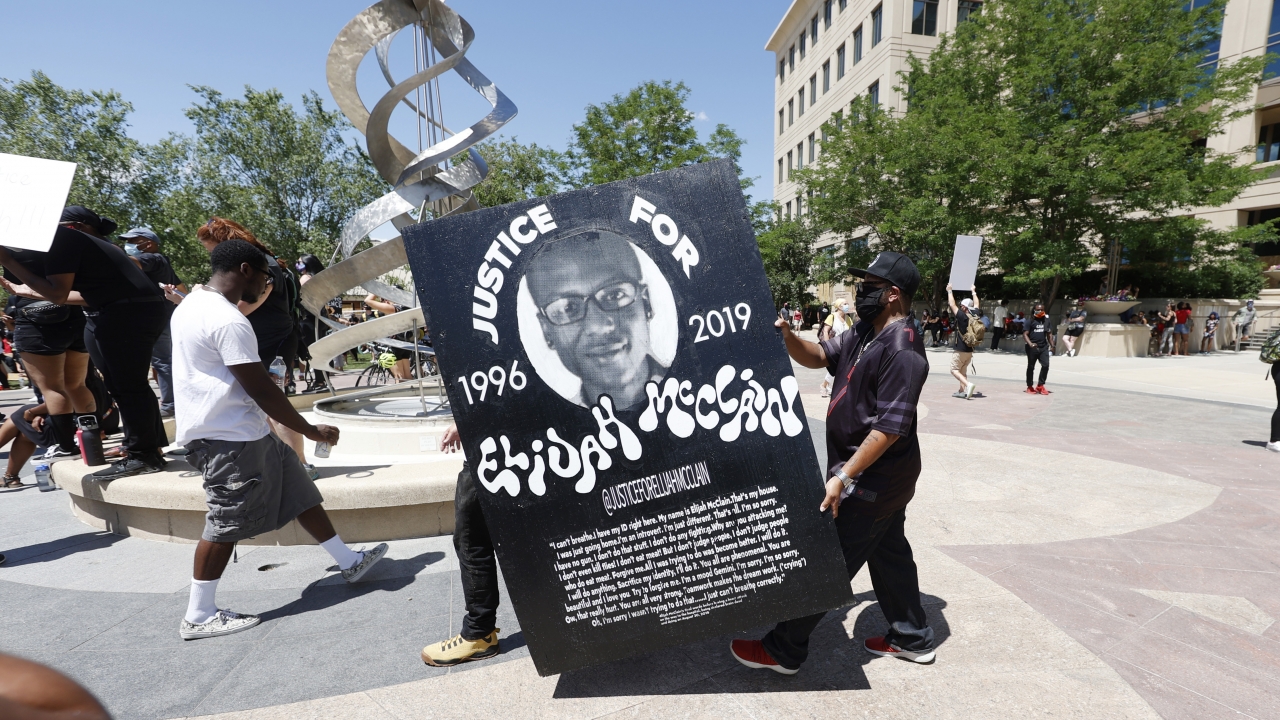Elijah McClain's mother left a Colorado courtroom in tears Friday after prosecutors showed video footage of the 23-year-old Black man pinned down by police officers during a fatal 2019 confrontation, which rose to prominence during nationwide protests over racial discrimination and excessive force in policing.
Two officers from the Denver suburb of Aurora are on trial for manslaughter and other felony charges. The episode was captured by police body cameras, and prosecutors are leaning heavily on that footage to convince jurors that excessive force contributed to McClain's death.
On the night he was stopped, McClain was walking home from a convenience store wearing a runner’s mask, covering his face below his eyes. The officers were responding to a report of a "sketchy" person in the neighborhood. McClain wore the mask because anemia made him cold, relatives later said.
The encounter quickly escalated and officers took him to the ground. McClain lost consciousness at least once after an officer put him in a neck hold pressing against his carotid artery.
McClain, a massage therapist who relatives described as a gentle introvert, threw up repeatedly after the neck hold. He was kept on the ground for 15 minutes before paramedics gave him 500 milligrams of ketamine. He suffered cardiac arrest on the way to the hospital and was taken off life support three days later.
Dr. David Beuther, a pulmonary critical care physician, testified Friday that he heard McClain panting during the encounter and that his breathing became more labored later. He said he believes McClain inhaled his vomit into his lungs, making it difficult for him to breathe, and was not able to expel it as he lay on his side, held down by police. His health continued to deteriorate to such an extent that he belonged in a hospital intensive care unit in the seconds before the ketamine was injected into his arm, he said.
The racial reckoning in the United States that followed George Floyd's murder by Minneapolis police brought renewed interest in McClain's death. Charges in the case were brought in 2021 after Colorado's attorney general convened a state grand jury to investigate.
A revised coroner’s report determined a powerful sedative called ketamine given by paramedics to McClain played a key role in his death.
Sheneen McClain, Elijah’s mother, sat in the front row of the courtroom for a third day and seemed to be breathing deeply as the video clips were shown for about an hour.
She turned down an offer of tissues as she sat near lawyers from the state toward the beginning of the footage but left the courtroom in tears when it ended. She sobbed as she was escorted into an office down the hallway and returned to watch testimony about an hour later.
At the end of the day outside court, McClain said she planned to be at the trial each day despite the pain of having to relive what happened to her son because she wanted people to know he was a real person.
"Knowing everything that Elijah went through gets me here everyday," she said.
The video shown Friday was enhanced by the prosecution to remove distracting sounds and brighten images from the confrontation on Aug. 24, 2019. Some jurors took notes and one appeared to doze off as the footage was played in the courtroom after the lights were lowered.
As the struggle starts, McClain can be heard saying "I intend to take my power back," and one of the officers radios for more help saying, "Give us more units. We’re fighting him."
Soon, muffled cries and groans can be heard from McClain. He apologizes and then appears to try to explain himself, but the officers do not respond.
When an officer tells him to stop moving McClain replies, "I wasn’t trying to do that. I can’t breathe correctly." McClain can be heard vomiting, and an officer directs McClain to throw up away from him.
The city of Aurora agreed in 2021 to pay $15 million to settle a lawsuit brought by McClain’s parents. The lawsuit alleged the force used by officers against McClain, and his struggle to survive it, dramatically increased the amount of lactic acid in his system, leading to his death, possibly along with the large dose of ketamine he was given.
Lawyers for the officers have argued their actions were in line with department policies and not responsible for McClain's death. They've sought to shift blame to the paramedics who injected the ketamine. Trials against a third officer and two paramedics are scheduled in the coming months.







